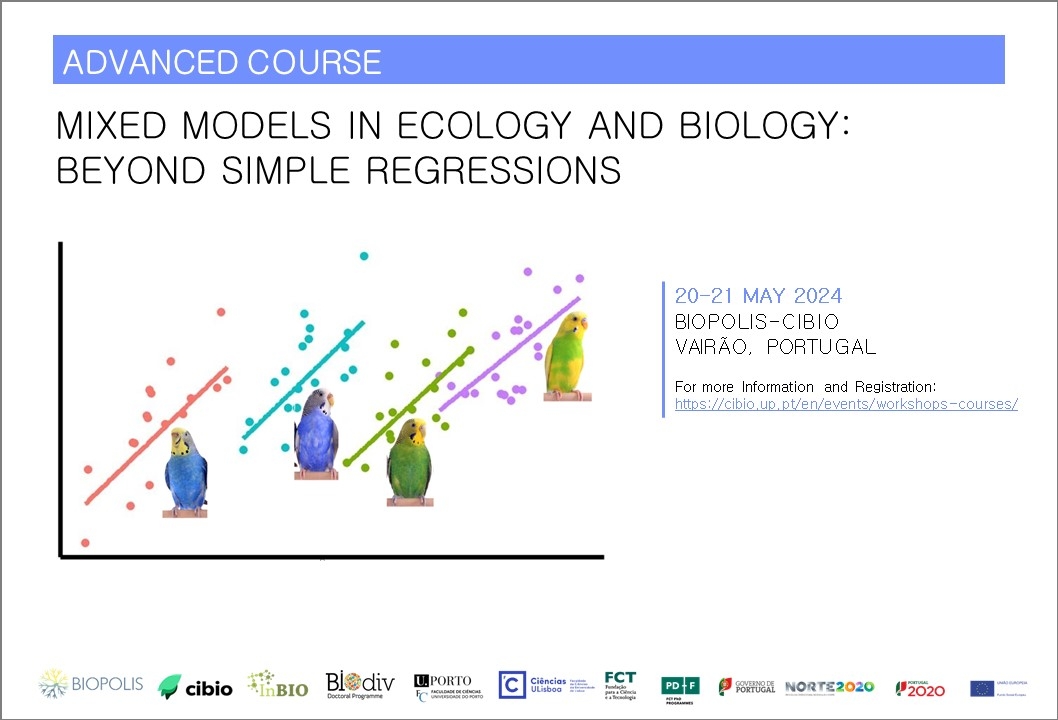Mixed models in Ecology and Biology: beyond simple regressions
Event
20 - 21 May 2024
Mixed models are a powerful, flexible tool that empower biologists to control for various sources of non-independence ("pseudoreplication”) without loosing (hardly any) statistical power to detect a significant pattern in their variable of interest. In this two-day course, students, who must already familiar with linear models and GLM in R, will learn how to code an implement the next natural step: mixed models. Students will learn the difference between fixed effects and random effects, will learn how to ditch clunky transformations and instead embrace the native distribution of the data, and will be forced to think critically about experimental design.
PROGRAM (12 hours)
May 20th, 2024
BIOPOLIS-CIBIO, Vairão, Portugal (Face-to-face)

20 - 21 May 2024
Mixed models are a powerful, flexible tool that empower biologists to control for various sources of non-independence ("pseudoreplication”) without loosing (hardly any) statistical power to detect a significant pattern in their variable of interest. In this two-day course, students, who must already familiar with linear models and GLM in R, will learn how to code an implement the next natural step: mixed models. Students will learn the difference between fixed effects and random effects, will learn how to ditch clunky transformations and instead embrace the native distribution of the data, and will be forced to think critically about experimental design.
PROGRAM (12 hours)
Participants will be given a lecture(s) on the theoretical underpinnings of the technique, and then will be walked through multiple examples using code while they follow along. The course coordinator is an ecologist (not a statstician) with a heavy bias in ecology and conservation, so students can expect examples to come from this applied field and for statistics to be interpretable in the language of biology/ecology rather than mathematics and statistics per se. Participants are strongly encouraged to come armed with their own datasets (formatted for GLMs and imported to R already) as they will be able to analyze them in class on the second day. Candidates must already have a strong knowledge of linear modelilng in R and a basic understanding of generalized linear models (GLMs) in R. In other words, this course is ideal for the intermediate level student in biological statistics.
SCHEDULE
2 days - 12 hours - Schedule: 10:00 - 13:00 & 14:00 - 17:00
COURSE INSTRUCTORS
Luke L. Powell (Coordinator) | BIOPOLIS/CIBIO - APPLECOL
Diogo Ferreira | BIOPOLIS/CIBIO
SELECTION CRITERIA
The course will be open to a maximum number of 20 participants.
75% of available student slots are reserved for BIODIV students.
Priority will be given to:
• 1st year and other PhD students attending the BIODIV Doctoral Program;
• PhD students attending other courses;
• Other post-graduate students and researchers.
REGISTRATION
65€ (students) | 100€ (other participants)
CIBIO-InBIO members will have an additional discount of 20%
Participation is free of charge for BIODIV Students MBGE 1st year Students & CIBIO's TwinLabs
CIBIO-InBIO members will have an additional discount of 20%
Participation is free of charge for BIODIV Students MBGE 1st year Students & CIBIO's TwinLabs
Registration fees do not include accommodation or meals
No ECTS credits are awarded for attending the course. Participants receive a certificate of attendance without quantitative evaluation
No ECTS credits are awarded for attending the course. Participants receive a certificate of attendance without quantitative evaluation
New application deadline: April 19, 2024
To apply, please fill the form available HERE
